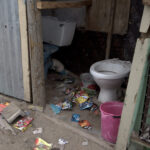New research may finally tell us why SA is always among the first to sound the alarm over drug-resistant strains.
Three-quarters of patients sent to doctors and clinics in South Africa were prescribed antibiotics for no reason, a new study has found.
In the cold and flu season of 2017, researchers from the University of the Witwatersrand and London School of Economics and Political Science (LSE) sent undercover patients to 186 private general practitioners and 73 public clinics. Before going incognito, the mystery patients received intensive training to make sure they all tell the same story to the doctors and nurses.
Here’s the catch: These secret medical shoppers weren’t sick at all.
‘I’ve had a cough for a week, and a cold that is getting better,’ they were trained to say, amongst other symptoms that would indicate acute bronchitis — a condition often caused by a viral infection that does not respond to antibiotics, a 2017 research review by the United Kingdom’s Cochrane organisation found.
Antibiotics are designed to fight bacteria — the medication doesn’t work for conditions caused by viruses.
Despite not showing any symptoms at all, the majority of both private and public “patients” in the Wits study were prescribed antibiotics anyway, preliminary research released Wednesday found.
“Antibiotics are the reason we’re all living longer,” says lead researcher and senior health systems researcher at Wits University’s Centre for Health Policy, Duane Blaauw.
But when the medications are misused, the bacteria that makes you sick learn how to outsmart the drugs, Blaauw says. As a result, infections that could have been easily snuffed out, such as bacterial pneumonia and TB, are becoming almost impossible to treat.
“We’re running out of drugs that work,” he warns. “And South Africa is a repeat offender.”
Blaauw says the country is “often the first to report resistant strains of bacteria”.
He and his colleagues argue a lack of knowledge could be behind this trend.
As part of the Wits study, the researchers surveyed more than 500 doctors nationwide to test their knowledge of antibiotic resistance. Half knew that antibiotics couldn’t treat acute bronchitis but this percentage fell to just 20% when doctors were faced with fake patients as part of the study.
In-depth interviews with real-life patients revealed further misconceptions about antibiotics.
“People are more concerned for their children than for themselves, so they’re more likely to expect antibiotics for them,” co-author and LSE associate professor Mylene Lagarde explains.
In the private sector, some patients demanded antibiotics from doctors and even asked for more for family members with the same symptoms.
Meanwhile, doctors revealed in interviews that their prescribing habits were driven in part by concern for patients and fears that people would not return if they got sicker.
The researchers also tried to see if educating patients to shy away from unnecessary medication or linking prescribing rates to a reduction in doctors’ salaries could help stem the tide of overtreatment.
First, they told their mystery patients to tell doctors and nurses that they would refuse antibiotics unless there was no other option. When clinicians faced these reluctant patients, prescribing of antibiotics dropped by about 20% across both the public and private sectors.
But even with this kind of resistance, the study’s results would still mean that more than half of those with viral bronchitis would have been given antibiotics.
Private doctors in the study prescribed far more drugs than their public sector peers. Researchers looked at whether deducting the prices of prescribed medication from doctors’ consulting fees could influence the way they dished out pills but found it made no difference.
As public health experts wrack their brains for the answer, Blaauw says, basic infections will continue to become more difficult to treat.
He explains: “It’s a public health emergency.”
Joan van Dyk was a health journalist, senior health journalist and news editor at Bhekisisa between 2017 and 2023.




